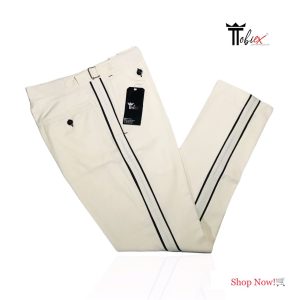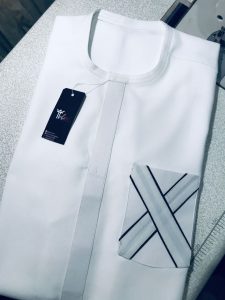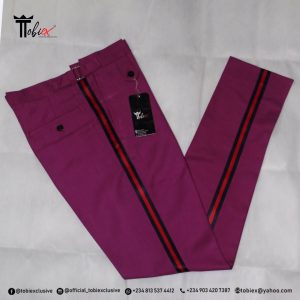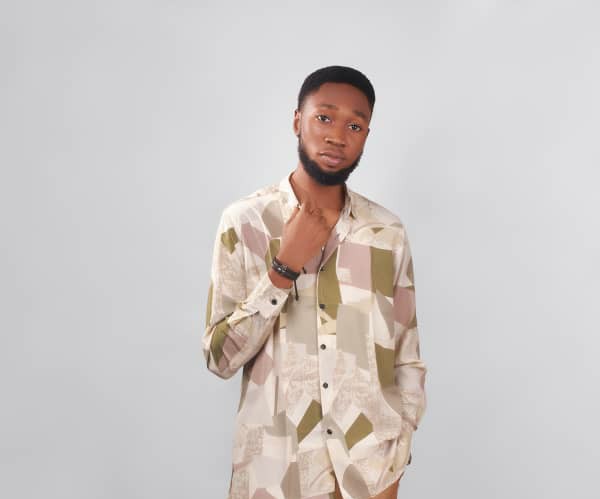Mr Oluwatobi Oladepo studied Social Works at the University of Benin. His mother exposed him to the world of fashion at an early. He was tutored under his mother’s tutelage and today he owns the Tobiex clothing brand which he established in 2017. In this interview, John said he hoped to take Nigeria’s fashion world to a new level.
Why didn’t you set out to look for white collar job after graduation?
I Studied Social Work at the University of Benin and graduated with a second-class Upper Division. I chose fashion design as my profession because of my passion for clothing style and aesthetics.
It has also been a part of my life since I was very young. Growing up with a mother who is a skilled fashion designer, I was exposed to the world of creativity, fabrics, and design from an early age.
Witnessing her passion and dedication to her craft inspired me deeply. As I learned the intricacies of fashion design from my mother, I realized that it was more than just creating clothes; it was about storytelling, self-expression, and making a statement through artistry. I found myself drawn to the idea of bringing my own unique vision to life and contributing to the ever-evolving world of fashion.

How has it been since you started out?
Starting my journey as a young entrepreneur in the field felt like a natural progression. I had a strong foundation and mentorship from my mother and other online courses on fashion design, which gave me the confidence to experiment and innovate.
Moreover, I saw the potential to carve out my niche in the industry, offering fresh perspectives and designs that resonate with a new generation of fashion enthusiasts. I established a fashion brand in 2017 (TOBIEX GLOBAL CONCEPT), which is popularly known as TOBIEX. It started as a Shirt Brand (Tobiex Shirt) and has since grown into other areas like the Tobiex Pant, Tobiex Casuals, Tobiex Senator and Kaftans and other products.
But there is no nexus between Social Works and Fashion?

Fashion design allows me to combine my creative flair with my entrepreneurial spirit. I’m excited by the opportunity to not only express myself but also to create a brand that stands for quality, innovation, and style. My upbringing and early exposure to this field have given me a unique advantage, and I’m committed to pushing boundaries, constantly learning, and contributing to the ever-changing landscape of fashion.
What can you say about the fashion industry?
The fashion industry is a dynamic and ever-evolving world. One key aspect to consider is the fast-paced nature of fashion trends. Styles and preferences change rapidly, necessitating constant innovation to stay relevant in the market. This demands an acute sense of observation, trend forecasting, and adaptability to create designs that capture the current zeitgeist.
Another significant facet is the importance of brand identity. Establishing a unique and compelling brand identity is crucial for standing out in a crowded market. This involves defining the design philosophy, target audience, and values that the brand represents. Crafting a strong brand identity fosters a loyal customer base and sets the foundation for long-term success. Collaborations and partnerships have become integral to the fashion industry. Working with other designers, influencers, or even cross-industry collaborations can significantly boost visibility and expand the customer base. Such partnerships not only enhance creativity but also enable brands to tap into new markets and demographics they might not have reached otherwise.

Within the fashion sector, sustainability has become a top priority. Consumers are becoming more aware of the ethical and environmental consequences of their purchases. As a fashion design entrepreneur, addressing these concerns by incorporating sustainable practices into the production process can be a differentiating factor. This might involve using eco-friendly materials, adopting ethical manufacturing processes, and promoting mindful consumption. Digital transformation has reshaped the way fashion brands operate. The rise of e-commerce, social media, and online marketing has created new avenues for reaching customers directly.
As a fashion design entrepreneur, leveraging these digital platforms is essential for building a strong online presence and engaging with a global audience. Social media, for instance, offers a space to showcase designs, interact with customers, and receive real-time feedback. In conclusion, the fashion industry is a multifaceted realm that requires continuous innovation, a well-defined brand identity, strategic collaborations, sustainability initiatives, and a strong digital presence. Navigating these aspects thoughtfully can pave the way for success as a fashion design entrepreneur in an ever-changing market.
What do you say about the fashion industry in your locality?
The fashion industry in my locality is a vibrant reflection of our culture and values. It seamlessly weaves tradition and innovation, creating a distinct aesthetic. Sustainability is a growing focus, with eco-conscious materials and practices taking center stage, aligning with our community’s environmentally conscious mindset.
Collaboration is key, as designers and artisans come together to infuse fresh perspectives into designs. This synergy fosters creativity and a sense of unity. As a local observer, I appreciate how collaboration breathes life into fashion here.
The digital age has redefined engagement. Social media serves as a prominent platform, allowing local designers to showcase their creations to a global audience. This digital presence reshapes accessibility and consumer interactions.
Craftsmanship is experiencing a renaissance, with handmade pieces holding immense value. This trend reflects a longing for authenticity and uniqueness in a mass-produced world. As a fashion enthusiast, I’m drawn to the intricate details and narratives woven into locally crafted pieces.
In essence, our fashion industry is a fusion of heritage, sustainability, collaboration, digital integration, and artisanal craftsmanship. These elements together craft a narrative that defines the local fashion landscape, influencing my perspective as I engage with and contribute to our dynamic fashion community.
Are you satisfied being a fashion designer?
Yes, my passion for fashion motivates me to become better in the field of fashion as the fashion industry is an ever-evolving and changing world. The removal of fuel subsidies in Nigeria has potentially affected the fashion business in various ways.
One significant impact is the increase in cost of production as fashion designers heavily rely on materials and equipment, and higher transportation cost for these inputs has elevated overall production expenses, potentially affecting the profit margin and leading to high product prices. It has also contributed to inflation, thereby causing consumers to cut back on non-essential spending, including fashion items. The decrease in demand has led to lower sales and revenue for fashion design businesses.
Have you been to any fashion show?
No sir.








Leave a Reply